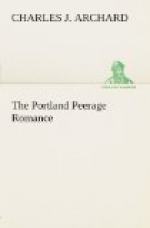The venerable Duke was immensely rich, for not only had he the patrimony of the Bentincks; but by his marriage with Miss Scott, there was brought into the family another acquisition of wealth.
He left his London property, so that if his son, the Marquis, had no male heirs, it should pass into the female line, which it did, and the first to inherit was the Viscountess Ossington.
This London property was of fabulous value and included Portland-place, Cavendish-square, Wimpole-street, Harley-street, Wigmore-street, and other houses in the neighbourhood.
Lady Ossington died before her sister, so all this wealth came to the Dowager Lady Howard de Walden, furnishing her with the splendid income of 180,000l. per annum.
The stake in the Druce claim is not only the Dukedom of Portland and the entailed estates of the Bentincks in the male line; but in the female line too, including this dazzling dowry of 180,000l. a year.
CHAPTER IV
THE FARMER DUKE’S DAUGHTER AND THE HOUSE OF COMMONS’ SPEAKER.—BECOMES A BENEVOLENT VISCOUNTESS
Place aux dames. Before relating some of the incidents in the careers of the fourth Duke’s high-spirited sons, the Marquis of Titchfield and Lord George Bentinck, place must be given to the social triumphs of his third daughter, Lady Charlotte Cavendish-Bentinck.
With all the advantages that wealth and birth could give her among the proud aristocracy of England the love affairs of Lady Charlotte did not run smooth. Her lover was Mr. John Evelyn Denison of Ossington Hall, about twenty miles from Welbeck in the same county of Nottingham. That the young Squire—of well-born family though he was—should aspire to the hand of a Duke’s daughter showed no want of spirit on his part. But after all he was only a Commoner, though he had in him the making of the First Commoner of England leading to a still higher elevation on the ladder of social distinction, until he became a peer of the realm, only three degrees lower in rank than the head of the Cavendish-Bentincks himself.
The Farmer Duke, simple though his tastes were, did not view with pleasure the courtship of his daughter by the young Squire of Ossington.
Lady Charlotte had mingling in her veins the blood of the highest nobility of three nations. The Cavendishes were among the flower of English chivalry, the Bentincks were renowned in Holland and the Scotts traced their lineage from the pride of Scotland.
The Duke could not bring himself all at once to give Lady Charlotte away to one who had no title.
She was a little over twenty years of age and when her father refused to hear of the suit of John Evelyn Denison she shed many tears in the presence of her maid. Life to her at this time was by no means so full of sunshine as is usually supposed to be the good fortune of Duke’s daughters.




